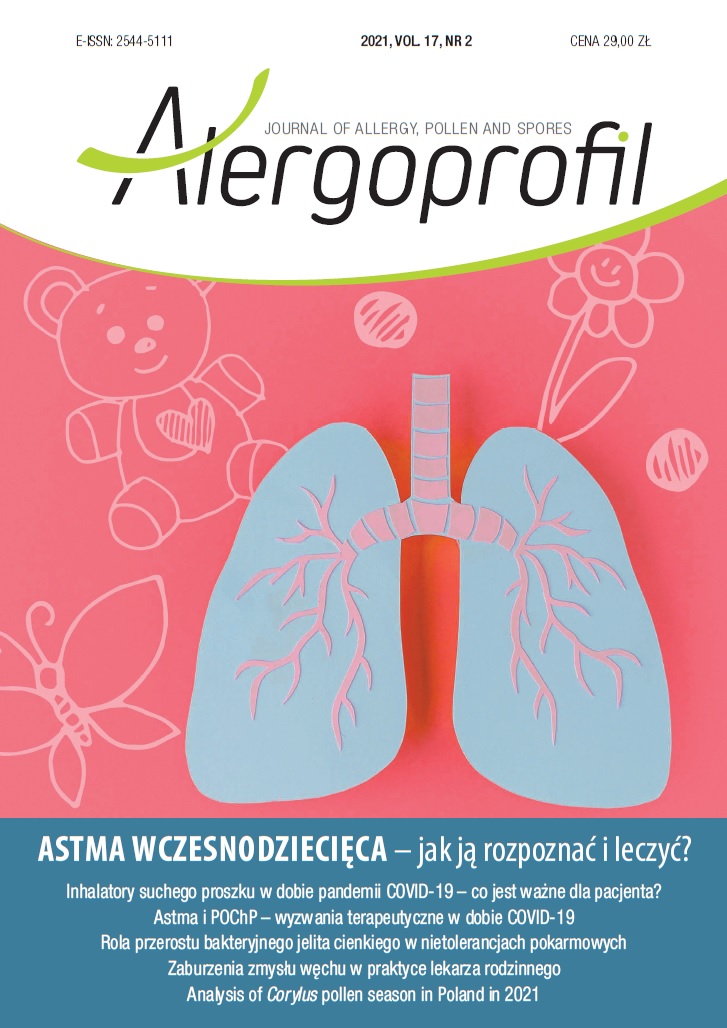Sense of smell disorders in family physician practice Review article
Main Article Content
Abstract
A properly functioning sense of smell recognizes both food and danger and provides sensory input. Sense of smell is lost and/or impaired in diseases accompanied by impaired nasal patency such as chronic rhinosinusitis with or without nasal polyps, allergic rhinitis, respiratory infections including acute rhinosinusitis. In the case of rhinosinusitis in adults, olfactory impairment is one of the four main symptoms of the disease. They can also be caused by damage to the olfactory neuron, e.g. in the course of a viral infection. Loss of smell and/or taste reported by patients with COVID-19 may be a diagnostic hint. Modern intranasal glucocorticosteroids are used to treat olfactory disturbances and loss of smell caused by nasal patency impairment (or accompanying diseases with nasal patency impairment).
Downloads
Article Details

This work is licensed under a Creative Commons Attribution-NonCommercial-NoDerivatives 4.0 International License.
Copyright: © Medical Education sp. z o.o. This is an Open Access article distributed under the terms of the Attribution-NonCommercial 4.0 International (CC BY-NC 4.0). License (https://creativecommons.org/licenses/by-nc/4.0/), allowing third parties to copy and redistribute the material in any medium or format and to remix, transform, and build upon the material, provided the original work is properly cited and states its license.
Address reprint requests to: Medical Education, Marcin Kuźma (marcin.kuzma@mededu.pl)
References
2. Buck LB. Olfactory receptors and odor coding in mammals. Nutrition Reviews. 2004; 62(11): 184-8.
3. Rapiejko P. Zaburzenia zmysłu węchu. Medical Education, Warszawa 2016.
4. Hawkes CH. Smell, taste and COVID-19: testing is essential. QJM. 2021; 114(2): 83-91. http://doi.org/10.1093/qjmed/hcaa326.
5. Saniasiaya J, Islam MA, Abdullah B. Prevalence of olfactory dysfunction in coronavirus disease 2019 (COVID-19): A metaanalysis of 27492 patients. Laryngoscope. 2020. http://doi.org/10.1002/lary.29286.
6. Rapiejko P, Lipiec A. Zaburzenia zmysłu węchu. Alergoprofil. 2021; 17(1): 3-10.
7. Rot P, Rapiejko P, Jurkiewicz D. Intranasal steroid therapy – EPOS 2020. Otolaryngol Pol. 2020; 74(3): 41-9. http://doi.org/10.5604/01.3001.0014.2449.
8. Sienkiewicz-Jarosz K. Zmysł węchu – fizjologia i patologia. Neurologia po Dyplomie. 2012; 7(4): 6-10.
9. Rapiejko P, Zawisza E, Lipiec A et al. Wspomaganie antybiotykoterapii zapalenia zatok przynosowych glikokortykosteroidem, pirośluzanem metazonu, stosowanym donosowo. Terapia. 200; 3(1): 29-31.
10. Hopkins C, Alanin M, Philpott C et al. Management of new onset loss of sense of smell during the COVID-19 pandemic – BRS Consensus Guidelines. Clin Otolaryngol. 2020. http://doi.org/10.1111/coa.13636.

